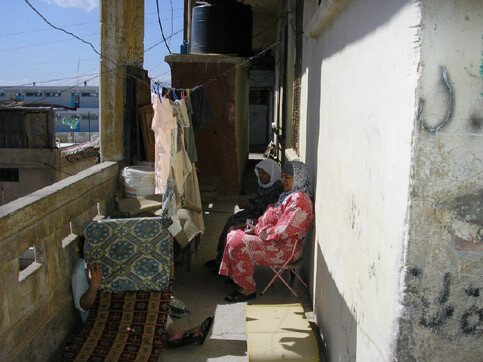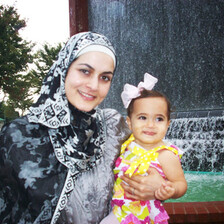Al Jazeera 16 May 2005

Palestinian refugees in Wavel refugee camp near Baalbek in Lebanon. (Arjan El Fassed)
Palestinian refugees in Lebanon look to Syria’s recent withdrawal from Lebanon, and their future, with anxiety and uncertainty. A week after Syrian military and intelligence units withdrew from their stronghold in Baalbak in the heart of the Beqaa Valley, there was little to indicate that they once controlled the streets of this sleepy town.
Besides a few worn posters of Syrian president Bashar al-Assad, change has come swiftly. Military checkpoints, once painted with the recognisable red and black of the Syrian flag, have been replaced with Lebanese cedars. Even a prominent sitting statue of the late Hafez al-Assad has been torn down and hauled back to Damascus.
For many Lebanese, the withdrawal was a momentous occasion marking the beginning of what they regard as their path towards an independent future. But not all parties in Lebanon have greeted the Syrian departure with such unbridled enthusiasm.
For Lebanon’s 400,000 Palestinian refugees, UN Security Council resolution 1559, and all that has followed it from unrest in Beirut to Syria’s withdrawal, has been met with grave concern. “I am very pessimistic about my future here,” says 18-year-old secondary school student Wael Issa, who lives in the Palestinian refugee camp of Wavel, popularly known as al-Jaleel, just south of Baalbeck. “I am very worried that they might target us after Syria. It’s all laid out in 1559: Syria … Hizb Allah … then us.”
Fear of reprisals
“People here in the camps are afraid,” explains 34-year-old refugee Fadi Yasin, who makes a living selling heating oil to his fellow refugees during Baalbeck’s fierce winters. “The general feeling is that it’s our turn now - [the Lebanese government] wants to get us out of here, the Syrian issue released the floodgates, and now the tide has turned.
“The state and the opposition have already begun talking about arms in the refugee camps. But this time there are no Syrian forces to protect us, and no guarantees for our safety.”
Yasin says memories of the Sabra and Shatila massacre of 1982, where 2800 Palestinian civilians - mostly women and children - were killed under the watchful eye of then Defence Minister Ariel Sharon, are all too fresh in the minds of many Palestinians here. For this reason, they view calls to disarm what little weapons that remain in the camps with fear, suspicion and hesitation.
“We learned our lesson from Sabra and Shatila. We disarmed in 1982 after the civil war, and then we were massacred by Sharon’s men, and this was with international protection,” he says.
Common view
Issa and Yasin’s are views echoed by Palestinians throughout Lebanon. As refugees, Palestinians in Lebanon live in a state of constant vulnerability with little to no civil rights. Unwanted by their host state and unable to return home, theirs is an existence of seeming permanent impermanence.
Their camps are effective ghettos, with their winding, narrow alleyways; wall-to-wall cement block shelters; tin-rooftops; abysmal public services. They lack day-to-day protection, such as physical security, freedom of movement, and access to employment. Abandoned underground bomb shelters - relics of the civil war - are testimony to the perilous times they have faced - times they fear they may live to see again.
Indeed, popular sentiment these days in Lebanon seems stridently against any foreign presence. As a banner in a rally welcoming home ex-prime Minister Michel Aoun from exile proclaimed in Beirut’s Martyr Square last week, “Lebanon is for the Lebanese.”
Analysis
Lebanese analysts insist, however, this is nothing more than ideological banter aimed at Syria, not Palestinians, and that while anti-Palestinian sentiment may exist among elements of Lebanese society, it is marginal and nothing can realistically come of it. “We also seek an end to the effective siege of the Palestinians refugee camps and their status as large group prisons”
“Yes, there are people who want [the Palestinians] out, but ethnic cleansing is not politically realistic. Public opinion would not accept such a move, and the EU wouldn’t allow it,” explains Samir Qassir, an influential Lebanese journalist and member of the Lebanese opposition’s media strategy campaign team.
“Even the Shia here can play the Palestinian card every now and then to avoid disarming themselves, but they will never accent ethnic cleansing of the Palestinians here.”
While sympathetic to the Palestinians that live among them, Baalbeck’s mainly Shia residents also desire to see the Palestinians return home, but for different reasons. “The Palestinians should not settle here - in Lebanon,” proclaims Hisham Mustafa, a 31-year-old Shia construction worker. “This is neither because we do not like them nor because we are harmed by them,” he explains.
“The Palestinians bring money to this country … they enrich the country. We want them to go to back to Palestine because it is their homeland and it is their right.” Mustafa says he is against disarming the Palestinians, however, because he considers them the weakest link in the chain. “If they disarm, it would be our turn next - the Shia and Hizb Allah.”
Improving ties?
Qassir believes the time is ripe for mending Lebanese-Palestinian ties, and the Palestinian leadership in the camps should capitalise on this moment, rather than fuelling flickering fires.
“There is a chance now I believe to improve the relationship, a chance for granting Palestinians their civil rights here, but we need to save this chance and not compromise it by making stupid pro-Syrian statements that would only give radical elements the excuse they need,” says Qassir, in reference to declarations by Sultan Abu al-Ayneen, the PLO’s representative in Lebanon, calling for the rejection of resolution 1559 and refusing disarmament of the camps.
“We can build on this momentum; but we have also to disarm radical Lebanese elements who could take a stand against the Palestinians.”
The Lebanese opposition, meanwhile, has taken a similar stance, saying that Palestinians should disarm - voluntarily, not by force - and the Lebanese government should reciprocate by ending its “racist and discriminatory policies” against them.
“Our party’s policy is supporting the Palestinian people who are in Lebanon for reasons outside their will,” explains Wael Abou Faour, a young Druze political leader who has risen in the ranks of the Progressive Socialist Party - the Druze movement headed by opposition leader Walid Jumblatt.
“The Palestinians today are part of the reconciliation between the different Lebanese factions and parties and the Palestinians are not in any direct confrontation with any of the parties - unlike the civil war,” he adds.
“We dismiss the 1559 which calls for the removal of the Palestinian resistance from Lebanon - but we call for a voluntary disarming of the Palestinians, we call on them to give up their arms to the Lebanese government in return for their civil rights, and for dealing with the Palestinian camps through the proper Lebanese ministries as an internal affairs issue rather than a security and military intelligentsia issue.
“We also seek an end to the effective siege of the Palestinians refugee camps and their status as large group prisons.”
Uncertain future
All this is of little comfort to Lebanon’s Palestinians, who can only guess at what the future holds for them. While the Taif Agreement to end the Lebanese civil war, signed in 1991, outright rejects naturalising them as Lebanese citizens, Israel denies them the right of return.
Still, there has been talk by the Lebanese opposition’s Jumblatt in the weeks following the assassination of former PM Rafiq al-Hariri of reconsidering the naturalisation option. But it is neither a solution the refugees desire nor believe is plausible, explains Sameera Abo al-Fool, a social worker and political activist in the Democratic Front for the Liberation of Palestine (PFLP) in Lebanon.
“There is no work here, no source of income. And we are treated like vermin. Among Syrians, Sri Lankans, and refugees - we are considered the lowest class,” says Abo al-Fool. She says Palestinians will always be considered a looming threat to Lebanon’s delicate political balance.
“Even if they naturalised us, we’re branded as strangers here, and we will never be integrated into Lebanese society. First of all, we are not welcome. Secondly, we will remain second-class citizens the rest of our lives. We will always be targeted, we will always be vulnerable.”
Laila El-Haddad is a journalist based in the occupied Gaza Strip. This article was originally published by aljazeera.net and reprinted on EI with permission.
Related Links





